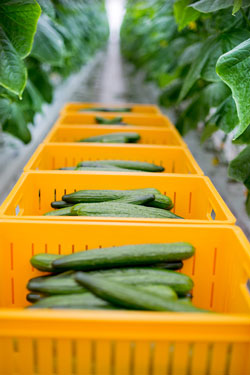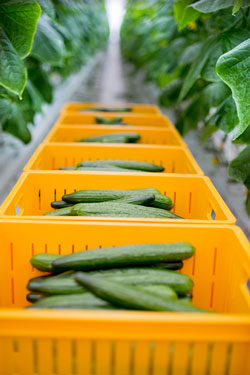- by Keith Loria | February 28, 2019
Gary W. Hickman, a greenhouse horticulture advisor at the University of California-Davis, noted a rise in greenhouse produce has come about in recent years thanks to more consumer demand amongst concerns of food safety, traceability, flavor and quality.
According to Cuesta Roble Greenhouse Vegetable Consulting, based in Mariposa, CA, the estimate of greenhouse-grown vegetables is currently 1.228 million acres.
Steve Zaccardi, director of sales for Mucci Farms, based in Kingsville, ON, said the biggest challenge facing the greenhouse industry today is the increased demand for sustainable packaging by way of reducing and/or eliminating plastic.
“While we make our best effort to find and use the most cost efficient and practical solutions, there has been a renewed emphasis on sustainability in recent months,” he said. “We are combating this challenge by studying biodegradable and compostable packaging that is used in several industries.”
Mucci Farms is currently using several recyclable packages and a handful of compostable options, and are looking to expand on them in the future.
“We’re in the fact-finding stages of how these materials will affect product quality, transportation and cost in the perishable food category,” Zaccardi said.
Most involved in the greenhouse industry feel that retailers benefit when they’re able to find ways to call attention to greenhouse grown product in-store.
“At the retail level, stores would benefit from finding ways to educate consumers on the benefits of greenhouse-grown product by educating produce staff, and using signage along with other means to highlight items in store,” Zaccardi said. “Partnering with growers to do in-store demos and social media campaigns have been very effective for Mucci Farms.”
Carlos Visconti, chief executive officer of Red Sun Farms, based in Kingsville, ON, said the company’s retail partners are doing a great job when it comes to marketing and pricing products, but agreed that education could go a long way.
“As growers, it’s our responsibility to work with our retail partners to inform and educate on the benefits of greenhouse grown produce,” he said. “Whether it’s through in-store promotions, social media, or even recipe development, every little bit helps to further understand the advantages of greenhouse grown products.”
Dino DiLaudo, vice president of sales for Westmoreland-TopLine Farms in Leamington, ON, has seen a natural shift towards more greenhouse produce at the retail level due to quality, service and the availability of product.
“The greenhouse-grown produce has really been a cornerstone of produce departments because our supply availability is so consistent,” he said. “Retailers can plan for promotions and count on the product to be there. Things don’t hinder the production so greenhouse has been able to take advantage.”

